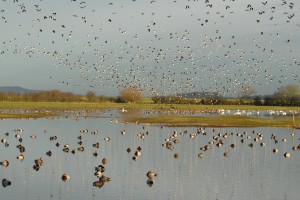Four wrongs don’t make a fiscal right


Chancellor George Osborne is wrong to so readily dismiss long-standing laws protecting sites and species.
He suggested in Tuesday’s Autumn Statement that the EU’s Birds and Habitats directives are hampering economic recovery. They might be “placing ridiculous costs on British business,” Osborne claimed.
The Chancellor’s statements reveal his misunderstanding of the benefits we accrue from nature and the safeguards EU laws provide. This is true in four ways:
First, protected sites and species contribute to individual, family and company wealth:
- houses next to wetlands can be worth 20% more because of their attractive location;
- wetlands clean sewage and other waste from urban areas, reducing water treatment bills for households and businesses;
- ponds and lakes in urban areas soak up rainwater, reducing drainage costs and flooding;
- even the self-employed can win: photographers earn a living selling pictures of wildlife;
- habitat restoration by water companies, often on protected sites, ensures water is clean when it runs into reservoirs and rivers so requiring little treatment.
Second, EU protection of sites and species increases local wealth:
- wetlands and other protected areas are popular visitor sites. WWT’s UK wetlands, many of which are protected by EU laws, attract one million visitors annually. Preventing development on them significantly boosts local economies;
- birdwatchers and goose shooters in Scotland spend around £5.4m annually in outlets close to the sites they visit;
- wetlands create productive farmland by providing a constant supply of nutrients. Where wetlands are protected, they guarantee soil quality. In 2008 this land was worth £15bn
Third, environmental measures increase national wealth:
- climate change is causing more severe weather. Floodplains, hillsides and gardens absorb considerable volumes of water but drained and developed they are worthless. Flooding in Tewkesbury and neighbouring areas in 2007 cost the UK £3.2bn;
- soil and plants absorb carbon too, so helping compensate for climate-changing emissions.
Fourth, they also increase psychological wealth:
- access to green space improves mental and physical well-being. Nature reduces stress and reduces the need for painkillers. It improves concentration and self-discipline in children. For these reasons, development around the Thames incorporated many natural spaces, including small wetlands.
A look back at recent history will show the Chancellor that sympathetic development has been possible on protected sites or near areas used by rare wildlife:
Plans for the London Array windfarm were altered in 2005 after 7,000 red-throated divers were found on the proposed site off the Kent and Essex coasts. Developers altered the scheme to prevent disturbance. Turbines are now operating.
Bathside Bay port in Essex, proposed on a site protected by EU law, won the go-ahead because compensatory habitat of equal value to wildlife was created elsewhere.
More recently, approval was granted for part of the Steart peninsula in Somerset to be turned into one of England’s largest man-made wetlands, partly to replace protected land lost by the extension of Bristol Port, should that go ahead.
The laws Osborne damns do not prevent development. Instead they recognise and value our natural assets, and set parameters within which new infrastructure can go ahead.
Without these two pieces of legislation, both made UK law by Conservative governments, some popular and well-known sites might no longer exist.
The Severn Estuary is one and could still be sacrificed to a costly 10-mile barrage. No photograph could replicate its memory. Watch this space.